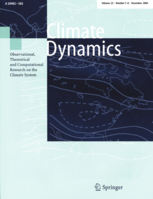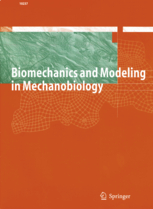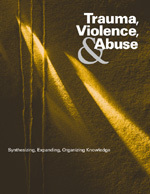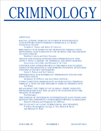Michael D. Maltz is an American electrical engineer, criminologist and Emeritus Professor at University of Illinois at Chicago in criminal justice, and adjunct professor and researcher at Ohio State University.

Climate Dynamics is a peer-reviewed scientific journal published by Springer Science+Business Media. It covers all aspects of the dynamics of global climate systems, including analytical and numerical modeling research on the structure and behavior of the atmosphere, oceans, cryosphere, biomass, and land surface as interacting components of the dynamics of global climate. The journal also publishes reviews and papers emphasizing an integrated view of the physical and biogeochemical processes governing climate and climate change.

The Journal of Physiology is a semi-monthly peer-reviewed scientific journal that was established in 1878 and is published by Wiley-Blackwell on behalf of The Physiological Society. It covers research on all aspects of physiology, with an emphasis on human and mammalian physiology, including work at the molecular level, at the level of the cell membrane, single cells, tissues or organs, and systems physiology. The full archive back to 1878 up to issues published 12 months from the current date is freely available online. The editor-in-chief is Kim Barrett. According to the Journal Citation Reports, the journal has a 2022 impact factor of 5.5.
Lawrence W. Sherman is an American experimental criminologist and police educator who is the founder of evidence-based policing.

Biomechanics and Modeling in Mechanobiology (BMMB) is a bimonthly peer-reviewed scientific journal published by Springer Science+Business Media. The journal was established in June 2002 and is currently edited by Gerhard A. Holzapfel and David Nordsletten. It publishes research articles about theoretical, computational, and experimental studies in the fields of biomedical engineering, biomechanics, and mechanobiology.
The Stockholm Prize in Criminology is an international prize in the field of criminology, established under the aegis of the Swedish Ministry of Justice. It has a permanent endowment in the trust of the Stockholm Prize in Criminology Foundation. The Stockholm Prize in Criminology is a distinguished part of the Stockholm Criminology Symposium, an annual event taking place during three days in June.

Punishment & Society is a peer-reviewed academic journal that covers the fields of criminology and penology. The journal's editors-in-chief are Kelly Hannah-Moffat and Mona Lynch. It was established in 1999 and is currently published by SAGE Publications.

Social & Legal Studies is a bimonthly peer-reviewed academic journal that covers feminist, post-colonial, and socialist economic perspectives to the study of law and criminology. The editors-in-chief are Carl Stychin, David Campbell, Vanessa Munro, and Marie Fox. It was established in 1992 and is published by SAGE Publications.

Theoretical Criminology is a peer-reviewed academic journal covering the fields of criminology and penology. The journal's editors-in-chief are Mary Francesca Bosworth and Leslie Paik. It was established in 1997 and is currently published by SAGE Publications.

The European Journal of Criminology is a peer-reviewed academic journal covering the field of criminology. The editor-in-chief is Paul Knepper. It was established in 2004 and is published by SAGE Publications on behalf of the European Society of Criminology.

Trauma, Violence, & Abuse is a peer-reviewed academic journal that covers research on trauma, abuse, and violence. The journal's editor-in-chief is Jon R. Conte. It was established in 2000 and is currently published by SAGE Publications.
David L. Weisburd, is an Israeli/American criminologist who is well known for his research on crime and place, policing and white collar crime. Weisburd was the 2010 recipient of the prestigious Stockholm Prize in Criminology, and was awarded the Israel Prize in Social Work and Criminological Research in 2015, considered the state's highest honor. Weisburd is Distinguished Professor of Criminology, Law and Society at George Mason University. and Walter E. Meyer Professor Emeritus of Law and Criminal Justice in the Institute of Criminology of the Hebrew University Faculty of Law. At George Mason University, Weisburd was founder of the Center for Evidence-Based Crime Policy and is now its Executive Director. Weisburd also serves as Chief Science Advisor at the National Policing Institute in Washington, D.C. Weisburd was the founding editor of the Journal of Experimental Criminology, and is editor of the Cambridge Elements in Criminology Series.

The Sociological Review is a quarterly peer-reviewed academic journal covering all aspects of sociology, including anthropology, criminology, philosophy, education, gender, medicine, and organization. The journal is published by SAGE Publications; before 2017 it was published by Wiley-Blackwell. It is one of the three "main sociology journals in Britain", along with the British Journal of Sociology and Sociology, and the oldest British sociology journal.

Criminology is a quarterly peer-reviewed academic journal published by Wiley-Blackwell on behalf of the American Society of Criminology. The editors-in-chief are Volkan Topalli and Thomas Loughran. The journal covers research in criminology, penology, cybercrime, deviance and criminal justice.
Evidence-based policing (EBP) is an approach to policy making and tactical decision-making for police departments. It has its roots in the larger movement towards evidence-based practices.
The Journal of Quantitative Criminology is a quarterly peer-reviewed academic journal in the field of criminology. It was established in 1985 and is published by Springer Science+Business Media. The editors-in-chief are John MacDonald and Greg Ridgeway.
The British Journal of Criminology is a bi-monthly peer-reviewed criminology and law journal focusing on British and international criminology. It is published by Oxford University Press on behalf of the Centre for Crime and Justice Studies and its editor-in-chief is Eamonn Carrabine.
The Academy of Experimental Criminology is a learned society founded in 1998 in order to recognize scholars who have made influential researchers in the field of experimental criminology. It does so by electing fellows annually, and by honoring criminologists with its Joan McCord Award and Young Experimental Scholar Award. The Academy was co-founded by David P. Farrington, who served as its second president from 2001 to 2003. The other founder was Lawrence W. Sherman, who served as its founding president from 1999 to 2001. It sponsors the Journal of Experimental Criminology, which was established in 2005.

Experimental criminology is a field within criminology that uses scientific experiments to answer questions about crime: its prevention, punishment and harm. These experiments are primarily conducted in real-life settings, rather than in laboratories. From policing to prosecution to probation, prisons and parole, these field experiments compare similar units with different practices for dealing with crime and responses to crime. These units can be individual suspects or offenders, people, places, neighborhoods, times of day, gangs, or even police officers or judges. The experiments often use random assignment to create similar units in both a "treatment" and a "control" group, with the "control" sometimes consisting of the current way of dealing with crime and the "treatment" a new way of doing so. Such experiments, while not perfect, are generally considered to be the best available way to estimate the cause and effect relationship of one variable to another. Other research designs not using random assignment are also considered to be experiments because they entail human manipulation of the causal relationships being tested.
Criminal Behaviour and Mental Health is a peer-reviewed scientific journal covering the relationship between criminal behavior and psychiatry. It was established in 1991 and is published five times per year by John Wiley & Sons. The editors-in-chief are Pamela Taylor, David P. Farrington, John Gunn, and Mary McMurran. According to the Journal Citation Reports, the journal has a 2020 impact factor of 1.929, ranking it 44th out of 69 journals in the category "Criminology & Penology", and 107th out of 144 journals in the category "Psychiatry ".










